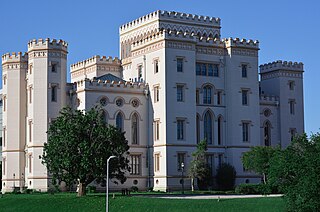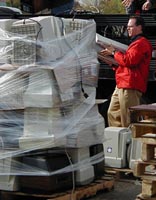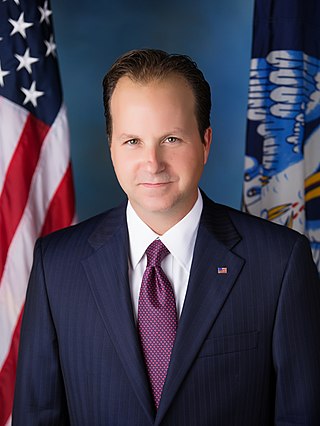Related Research Articles

Baton Rouge is a city in and the capital of the U.S. state of Louisiana. Located the eastern bank of the Mississippi River, it is the parish seat of East Baton Rouge Parish, Louisiana's most populous parish—the equivalent of counties in other U.S. states. Since 2020, it has been the 99th-most-populous city in the United States and the second-largest city in Louisiana, after New Orleans; Baton Rouge is the 18th-most-populous state capital. According to the 2020 United States census, the city-proper had a population of 227,470; its consolidated population was 456,781 in 2020. The city is the center of the Greater Baton Rouge area—Louisiana's second-largest metropolitan area—with a population of 870,569 as of 2020, up from 802,484 in 2010.

East Baton Rouge Parish is the most populous parish in the U.S. state of Louisiana. At the 2010 U.S. census, its population was 440,171, and 456,781 at the 2020 census. The parish seat is Baton Rouge, Louisiana's state capital. East Baton Rouge Parish is located within the Greater Baton Rouge area.
Southeastern Louisiana University (Southeastern) is a public university in Hammond, Louisiana. It was founded in 1925 by Linus A. Sims as Hammond Junior College. Sims succeeded in getting the campus moved to north Hammond in 1928, when it became known as Southeastern Louisiana College. It achieved university status in 1970.

Electronic waste recycling, electronics recycling ore-waste recycling is the disassembly and separation of components and raw materials of waste electronics; when referring to specific types of e-waste, the terms like computer recycling or mobile phone recyclingmay be used. Like other waste streams, re-use, donation and repair are common sustainable ways to dispose of IT waste.

Robert Pete Williams was an American Louisiana blues musician. His music characteristically employed unconventional structures and guitar tunings, and his songs are often about the time he served in prison. His song "I've Grown So Ugly" has been covered by Captain Beefheart, on his album Safe as Milk (1967), and by The Black Keys, on Rubber Factory (2004).

Electronic waste or e-waste describes discarded electrical or electronic devices. Used electronics which are destined for refurbishment, reuse, resale, salvage recycling through material recovery, or disposal are also considered e-waste. Informal processing of e-waste in developing countries can lead to adverse human health effects and environmental pollution.

Formosa Plastics Corporation is a Taiwanese plastics company based in Taiwan that primarily produces polyvinyl chloride (PVC) resins and other intermediate plastic products. It is the corporation around which influential businessman Wang Yung-ching formed the Formosa Plastics Group, and it remains central to the Group's petrochemical operations. The president of Formosa Plastics Corp. (FPC) is Jason Lin (林健男).

Construction waste or debris is any kind of debris from the construction process. Different government agencies have clear definitions. For example, the United States Environmental Protection Agency EPA defines construction and demolition materials as “debris generated during the construction, renovation and demolition of buildings, roads, and bridges.” Additionally, the EPA has categorized Construction and Demolition (C&D) waste into three categories: non-dangerous, hazardous, and semi-hazardous.

Tom Szaky is the CEO and founder of TerraCycle, a private, US-based business headquartered in Trenton, New Jersey that turns non-recyclable pre-consumer and post-consumer waste into raw material to be used in new products.

The World Reuse, Repair and Recycling Association (WR3A) is a business consortium dedicated to the reform of the trade of e-waste. The WR3A is inspired by fair trade organizations.

The foundation of Baton Rouge, Louisiana, dates to 1721, at the site of a bâton rouge or "red stick" Muscogee boundary marker. It became the state capital of Louisiana in 1849.

Electronic waste or e-waste in the United States refers to electronic products that have reached the end of their operable lives, and the United States is beginning to address its waste problems with regulations at a state and federal level. Used electronics are the quickest-growing source of waste and can have serious health impacts. The United States is the world leader in producing the most e-waste, followed closely by China; both countries domestically recycle and export e-waste. Only recently has the United States begun to make an effort to start regulating where e-waste goes and how it is disposed of. There is also an economic factor that has an effect on where and how e-waste is disposed of. Electronics are the primary users of precious and special metals, retrieving those metals from electronics can be viewed as important as raw metals may become more scarce

Laila Rashed Iskander Kamel is an Egyptian social entrepreneur and politician. She is formerly Egypt's Minister of State for Environment Affairs in the interim government of Prime Minister Hazem El Beblawi.
Environmental Waste Solutions (EWS) is a private U.S. small business headquartered in Baton Rouge, Louisiana, which specializes in assisting businesses in becoming more environmentally friendly. The company can be seen as one approach to environmental consulting, a growing international industry specialized in aiding home owners and businesses in their adjustment to an increasingly green economy. Environmental consulting agencies like EWS also contend with issues such as the triple bottom line and sustainability.

Paul Bryan Hollis is a Republican member of the Louisiana House of Representatives for the revised 104th District in St. Tammany Parish in southeastern Louisiana.
The Louisiana Business & Technology Center (LBTC) at Louisiana State University plays an important role to the state's flagship university, Louisiana State University as a part of LSU's Office of Research and Economic Development. LBTC's primary goal is to increase the economic growth of Louisiana by enhancing the development of small businesses and assisting in the development of new businesses. The center is ranked among the top ten entrepreneur programs in the nation. In 1988 it was jointly funded through LSU and the Greater Baton Rouge Chamber of Commerce to foster economic growth in Louisiana by providing businesses with applications and tools necessary for growth and survival in the real world. It comprises the Louisiana Technology Transfer Office (LTTO), the LBTC Business Incubator, and the LSU Student Incubator.
McCastle v. Rollins is a case that was filed on behalf of the residents of Alsen, Louisiana against Rollins Environmental Services, Inc., and. Although the decision in this case allowed the plaintiffs within this community to be certified as a class, and allowed them to be viewed as a unit when filing their lawsuit, and thereby reversing the decision that had been made at the trial and appellate level, the case was not reheard in the lower courts. Instead, Rollins Environmental Services, Inc. settled with the plaintiffs outside of court in 1987. Although this case is primarily cited for what a group of people need to do in order to obtain class certification, it is also often cited as one of the pivotal moments in the Environmental justice grass roots movement that has been occurring within communities of color. The people involved in the suit look at the way in which their community was disproportionately impacted by toxic waste polluters in light of their race and class, in comparison to communities that are composed of people who are racially and economically privileged and advocated for more considerate treatment by state regulators and operators of waste disposal plants. Through looking at the development of the McCastle v. Rollins lawsuit, one can see the way in which class, race, legal claims, community activism, public health and environmentalism can be viewed and used in conjunction with one another to protect the rights of people living within a given community.

Bilikiss Adebiyi or Bilikiss Adebiyi-Abiola is a Nigerian entrepreneur who founded the Lagos-based recycling company Wecyclers and is currently the Director General of the Lagos State Records and Archives Bureau (LASRAB) and Managing Director of the Lagos State Parks and Gardens Agency (LASPARK). She is also a member of the Board of Trustees of the Lagos State Employment Trust Fund.
Ecopreneurship is a term coined to represent the process of principles of entrepreneurship being applied to create businesses that solve environmental problems or operate sustainably. The term began to be widely used in the 1990s, and it is otherwise referred to as "environmental entrepreneurship." In the book Merging Economic and Environmental Concerns Through Ecopreneurship, written by Gwyn Schuyler in 1998, ecopreneurs are defined as follows:
"Ecopreneurs are entrepreneurs whose business efforts are not only driven by profit, but also by a concern for the environment. Ecopreneurship, also known as environmental entrepreneurship and eco-capitalism, is becoming more widespread as a new market-based approach to identifying opportunities for improving environmental quality and capitalizing upon them in the private sector for profit. "

In August 2016, prolonged rainfall from an unpredictable storm resulted in catastrophic flooding in the state of Louisiana, United States; thousands of houses and businesses were submerged. Louisiana's governor, John Bel Edwards, called the disaster a "historic, unprecedented flooding event" and declared a state of emergency. Many rivers and waterways, particularly the Amite and Comite rivers, reached record levels, and rainfall exceeded 20 inches (510 mm) in multiple parishes.
References
- ↑ Darwyn Williams founds Environmental Waste Solutions Archived April 3, 2010, at the Wayback Machine
- ↑ "Bootstrapping: Great Companies Started with Less than a Thousand Dollars, Barter Article". August 1995.
- ↑ "Bootstrapping: Great Companies Started with Less than a Thousand Dollars, Barter Article". August 1995.
- ↑ Darwyn Williams BIO on BusinessReport.com Archived April 3, 2010, at the Wayback Machine
- ↑ "Bootstrapping: Great Companies Started with Less than a Thousand Dollars, Barter Article". August 1995.
- ↑ "FINDING MILLION$ IN THE TRASH". Archived from the original on 2011-10-01.